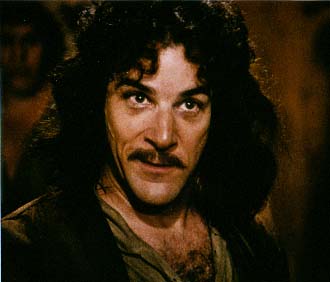I'm not really sure what to say about "stories of love and revenge." They are... certainly two genres of stories, with a great history behind each. I suppose I relate to stories of love more, since I have experienced much more love than I have urges for revenge. However, a revenge story is certainly cathartic when done well, because it taps into some primal urge or another for violent, immediate revenge. Perhaps it says something that creating a convincing and engaging revenge story is far easier, in my opinion at least, than crafting a convincing and interesting love story. Revenge is, after all, such a simple urge - I hate, therefore I must destroy. If one is to take a negative view of human nature, revenge is by far the most natural thing of all. Love, by contrast, is such a complex, such a nebulous human experience, it is nearly impossible to pin down in a truly satisfactory way.
By far my favorite story of both types is The Princess Bride, a film which rather seemlessly combines these themes of love and revenge, not simply by containing a story of love (that of Wesley and Buttercup) and a story of revenge (that of Inigo Montoya and the Six-Fingered Man), but also by making each of those stories themselves both stories of love and revenge - Wesley certainly loves Buttercup, but he is driven to take revenge on Humperdink as well, for his treatment of both Buttercup and himself (a revenge which, in my opinion, is the most satisfying of the movie despite its lack of a deadly finale); Inigo's story, conversely, is characterized as much by a love for his father as it is by a hatred for the man who killed him. One may also consider the character of Fezzik, who embodies love towards all of the protagonists. These three characters' dedication and love for one another and for others is what remarkably ties four disparate characters with rather different aims into a cohesive band of friends.
 |
| My name is Inigo Montoya, you killed my father, prepare to die |
No comments:
Post a Comment